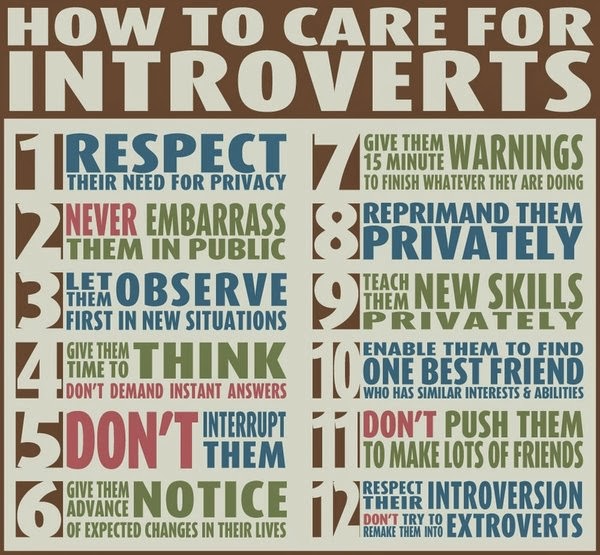More than one-third of the world’s population are introverts, according to Susan Cain, author of Quiet: The Power of Introverts in a World that Can’t Stop Talking. That means, if you are leading a team of three or more people, most likely at least one of them is an introvert. And if you’re an extravert, chances are you’ve had some challenges in the way you and that team member interact.
While we all have both introversion and extraversion qualities, which reveal themselves based on the situation, we tend to lean more toward one than the other. Although many people still seem to define extraversion as “outgoing” and introversion as “shy”, the real difference between them has to do with the source of energy. Extraverts derive their energy from others (extra), introverts derive their energy from within (intro). Extraverts love large social gatherings and fast-paced conversations, and often get bored with too much time alone. Introverts prefer smaller gatherings, and are quite content to spend time in more solitary activities such as reading, writing and thinking.
Both extraverts and introverts bring value to the team. The introverts, though, are less likely to tell you about it. So I’ll do it for them, and then give you, the extravert leader, some tips on how to lead them effectively.
Five great qualities of introverts:
-
-
- They are good listeners.
- They are planners.
- They form deep, meaningful relationships.
- They work independently.
- They keep their emotions in check.
-
To lead introverts effectively, you’ll need to adapt some of your extravert qualities to meet them where they feel most comfortable. Here are some key areas to pay attention to.
Communication: Introverts think to speak. Don’t put them in a position where they have to give an immediate answer or report out on the spot. Pace your questions. Give them time to process information. Allow them to pause and reflect before they respond. Respect their silence and don’t interrupt their thinking.
Recognition: Introverts generally prefer to be recognized for their efforts in a personal rather than a public way. At least give them the option. Come to think of it, this is a simple question you should ask all your employees, both introverts and extraverts – “How do you like to be recognized for your accomplishments?”
Meetings: Send out the agenda before the meeting so they have time to think about the topics and what they want to bring to the discussion. During the meeting, manage the extraverts so that the introverts have the opportunity to speak. Don’t ask for their feedback immediately after the meeting; give them some time to process it. You will get valuable feedback.
Workspace: Introverts prefer a quiet, private workspace that allows them to “recharge” by spending some time alone. If this isn’t feasible because of cubes or an open office environment, allow them to work at home occasionally or to retreat to a conference room.
Work style: Introverts have tremendous powers of concentration. Refrain from interrupting this with multiple check-ins throughout the day. Consolidate your non-urgent questions into one conversation. Best: by email.
The best performing teams are made up of individuals of differing skills, experiences and personalities. Keeping this in mind as you work through the four domains of leadership: Leading through People; Leading with Vision; Leading with Drive; and Leading to Deliver, will increase your effectiveness exponentially.
Want to learn more about the leadership domains and understanding your style and others? Contact me.
Till next time,
Karen









